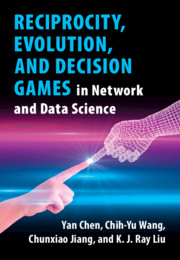Book contents
- Frontmatter
- Contents
- Preface
- 1 Basic Game Theory
- Part I Indirect Reciprocity
- Part II Evolutionary Games
- Part III Sequential Decision-Making
- 11 Introduction to Sequential Decision-Making
- 12 Chinese Restaurant Game: Sequential Decision-Making in Static Systems
- 13 Dynamic Chinese Restaurant Game: Sequential Decision-Making in Dynamic Systems
- 14 Indian Buffet Game for Multiple Choices
- 15 Hidden Chinese Restaurant Game: Learning from Actions
- 16 Wireless Network Access with Mechanism Design
- 17 Deal Selection on Social Media with Behavior Prediction
- 18 Social Computing: Answer vs. Vote
- Index
13 - Dynamic Chinese Restaurant Game: Sequential Decision-Making in Dynamic Systems
from Part III - Sequential Decision-Making
Published online by Cambridge University Press: 01 July 2021
- Frontmatter
- Contents
- Preface
- 1 Basic Game Theory
- Part I Indirect Reciprocity
- Part II Evolutionary Games
- Part III Sequential Decision-Making
- 11 Introduction to Sequential Decision-Making
- 12 Chinese Restaurant Game: Sequential Decision-Making in Static Systems
- 13 Dynamic Chinese Restaurant Game: Sequential Decision-Making in Dynamic Systems
- 14 Indian Buffet Game for Multiple Choices
- 15 Hidden Chinese Restaurant Game: Learning from Actions
- 16 Wireless Network Access with Mechanism Design
- 17 Deal Selection on Social Media with Behavior Prediction
- 18 Social Computing: Answer vs. Vote
- Index
Summary
Users in a social network are usually confronted with decision-making under uncertain network states. While there are some works in the social learning literature on how to construct belief in an uncertain network state, few studies have focused on integrating learning with decision-making for the scenario in which users are uncertain about the network state and their decisions influence each other. Moreover, the population in a social network can be dynamic since users may arrive at or leave the network at any time, which makes the problem even more challenging. In this chapter, we introduce a dynamic Chinese restaurant game to study how a user in a dynamic social network learns about the uncertain network state and makes optimal decisions by taking into account not only the immediate utility, but also subsequent users’ influence. We introduce a Bayesian learning-based method for users to learn the network state and discuss a multidimensional Markov decision process-based approach for users to make optimal decisions. Finally, we apply the dynamic Chinese restaurant game to cognitive radio networks and use simulations to verify the effectiveness of the scheme.
Keywords
- Type
- Chapter
- Information
- Publisher: Cambridge University PressPrint publication year: 2021



